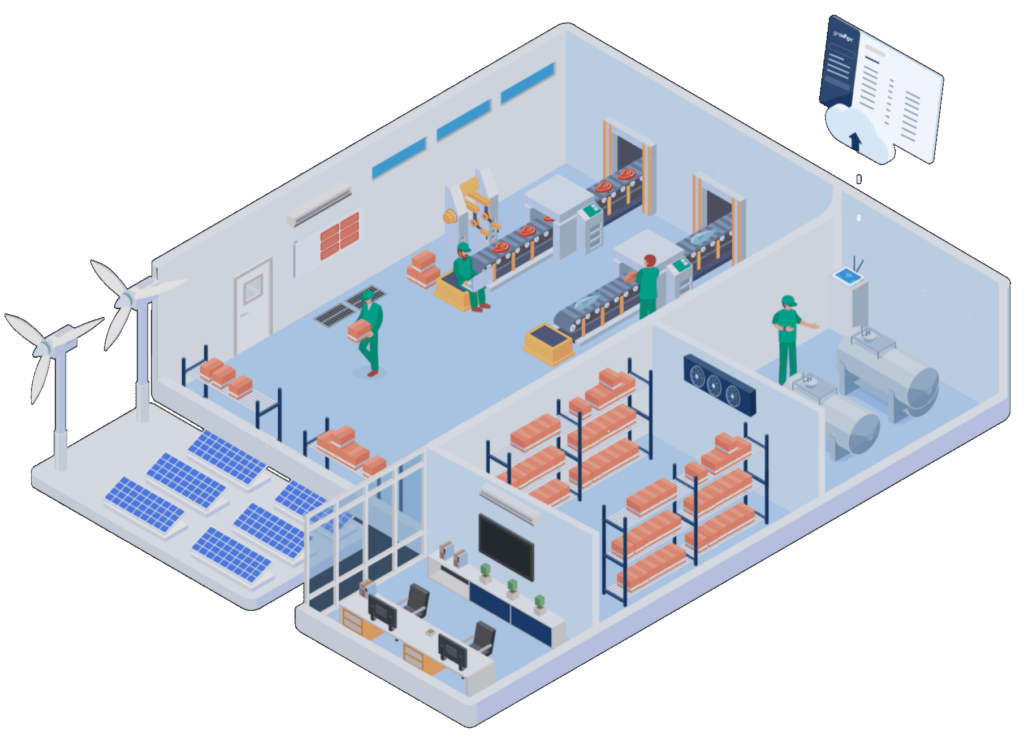Gradhoc
Challenges faced by Finance Departments in Food Industry
Smart refrigeration, cooler future
Request a demo or a quote
Request a demo tailored to your specific needs, with a focus on business cost reduction in the food industry
Gradhoc
Technology to Achieve up to 40% Energy Cost Savings and Over 25% Reduction in Refrigeration Operating Costs
In a competitive landscape, optimizing energy and personnel costs is a top priority for financial executives in the food industry, where refrigeration can account for up to 80% of total energy expenses. The finance department often faces significant pressure to manage these costs effectively.
The lack of automation in refrigeration systems often limits meaningful improvements, leading many CFOs to view these expenses as inevitable due to their complexity.
The innovative Smart Cooling platform revolutionizes this scenario by automating data acquisition and analysis. By harnessing the power of AI and advanced algorithms, this system enables finance departments to achieve up to 40% energy cost savings and more than 25% reductions in maintenance expenses.
Is your finance department equipped with an intelligent system to optimize costs?

Concerns of Finance Departments |
|---|
Viewing high costs as unavoidable due to the technical complexity of modern refrigeration systems.
|
Reducing energy expenses, particularly in refrigeration systems, which can account for up to 80% of total energy costs. |
Lack of intelligent automation in refrigeration systems, hindering continuous cost optimization. |
Rising maintenance costs driven by reactive management approaches and the reliance on incomplete or inconsistent data. |
Reduced equipment lifespan, shortening amortization periods and increasing expenditures on new machinery. |
The critical need for collaboration between financial and technical teams to implement effective solutions. |
Gradhoc
With Gradhoc you overcome these challenges
Gradhoc is a cloud-based solution designed specifically for the agri-food industry, aimed at optimizing refrigeration processes and ensuring the continuous operation of critical facilities. For finance departments, this system represents a key tool for improving profitability and optimizing operational resources by significantly reducing operational costs and improving energy efficiency.
By integrating technologies like IoT, AI, and digital twins, Gradhoc continuously monitors refrigeration systems, predicts potential failures, and automatically takes corrective actions before issues arise.
The predictive maintenance and optimization capabilities not only prevent failures but also this proactive approach substantially reduces maintenance costs, extends the lifespan of refrigeration equipment, and ensures product quality and safety, translating into lower costs and financial risks for the company.
In an industry where food safety and operational efficiency are paramount, Gradhoc provides peace of mind to financial managers by ensuring that refrigeration systems perform optimally, both technically and economically, meaning at the lowest possible cost, now and in the future.
With Gradhoc, you not only address the challenges faced by Financial Managers as outlined above, but you also contribute to achieving the objectives of other departments within the organization. Align your goals and foster strategic collaboration with your fellow managers!
Concerns from other areas of the Organization | Maintenance | Quality | Sustainability | IT | Production | R&D |
|---|---|---|---|---|---|---|
Reactive system management: reliance on corrective maintenance. | ||||||
Excessive manual on-site interventions. | ||||||
Reduced equipment and machinery lifespan. | ||||||
High costs: energy and maintenance expenses. | ||||||
Hurdles in ensuring food safety. | ||||||
Difficulties in documenting HACCP (Hazard Analysis and Critical Control Points). | ||||||
Regulatory compliance: food safety, energy reduction, and food waste minimization. | ||||||
Raw material waste and product losses. | ||||||
Production downtime. | ||||||
Difficulty in achieving product temperature traceability. | ||||||
Data management issues: absence of data or inconsistent data streams. | ||||||
Heterogeneous information from different manufacturers and sources. | ||||||
Deployment of monolithic solutions with limited integration capability. | ||||||
Disaggregated information across various refrigeration subsystems. | ||||||
Specialized maintenance requiring dedicated personnel. | ||||||
Excessive personnel time allocated to operational task. | ||||||
Employee stress: unplanned tasks, emergencies, or production halts. | ||||||
Legacy technologies with limited traceability in processes. |
Gradhoc
The role of Technology in overcoming challenges and shaping the future of Finance Departments
From a financial manager’s perspective, fostering business growth requires navigating a complex landscape of financial decisions, market trends, and technological advancements. The role of technology in supporting this growth is undeniable, as it helps optimize processes, reduce costs, and provide valuable insights for informed decision-making.
Challenges faced by finance departments are often multi-faceted, ranging from budgeting constraints to maintaining profitability in volatile markets. As organizations expand, the need for more sophisticated financial tools becomes evident. Technology is playing a critical role in streamlining financial operations and enabling real-time data analysis, which enhances the ability to forecast, plan, and make strategic decisions. It is crucial for financial managers to embrace innovative technologies that not only support day-to-day operations but also align with long-term business objectives.
In this context, automation, artificial intelligence, and machine learning are transforming financial management by offering predictive analytics and process automation, thereby allowing finance leaders to focus on strategic oversight rather than manual tasks. Furthermore, technologies like blockchain are improving transparency and security in financial transactions, further contributing to growth opportunities.
In addition to these advancements, what is a primary area of concern for financial managers in the current landscape? It is the challenge of balancing technological innovation with risk management. As businesses continue to leverage technology for growth, they must remain vigilant about cybersecurity threats and compliance requirements. Ensuring the integrity of financial data while embracing new technologies is a delicate balancing act that every financial manager must navigate.
As the future of financial management continues to be shaped by innovation, those who can harness the power of technology while addressing the challenges faced by finance departments will position their businesses for long-term success.
Gradhoc
Will you prepare for change?
Fill out the form to request a demo or a quote